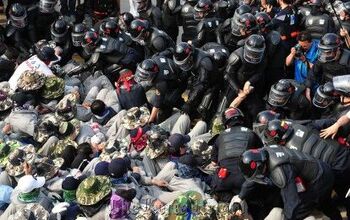Labor Unrest In South Africa

South Africa’s main auto union threatened to “halt production” at a Volkswagen after union members were fired, Reuters says.
“We call on the Volkswagen South Africa oligarchy to immediately stop these dismissals of workers. If VWSA fails to adhere to this demand, we will be forced to halt production until this impasse is resolved,” the National Union of Metal Workers of South Africa told the wire.
Tensions in South Africa are high. On Tuesday, ten striking South African miners were hit by rubber bullets, as labor strife spread ahead of mid-year pay negotiations. A Mercedes-Benz plant in the country was shut for two days when workers walked out after they were asked to remove their overalls when going outside, and not to wear them when returning..
Metal workers in South Africa demand a 20 percent industry-wide salary hike.

Bertel Schmitt comes back to journalism after taking a 35 year break in advertising and marketing. He ran and owned advertising agencies in Duesseldorf, Germany, and New York City. Volkswagen A.G. was Bertel's most important corporate account. Schmitt's advertising and marketing career touched many corners of the industry with a special focus on automotive products and services. Since 2004, he lives in Japan and China with his wife <a href="http://www.tomokoandbertel.com"> Tomoko </a>. Bertel Schmitt is a founding board member of the <a href="http://www.offshoresuperseries.com"> Offshore Super Series </a>, an American offshore powerboat racing organization. He is co-owner of the racing team Typhoon.
More by Bertel Schmitt































Comments
Join the conversation
Ford and Opel both had manufacturing plants and strong sales there during the aparthiet years. Both companies are ultimately American. Opel's where sold by a South African company called Delta and the Ford business went through Ford UK but I'll bet neither GM nor Ford US turned the profits away.
There has been some unrest of late in all sectors. Mining and services have been hard hit. Strikes that lead to violent protests are fairly common and cyclical, very often it's political. There are elections coming up soon and that always brings out ugliness. The motor industry is very strong there and it's highly unlikely it will fail from these last protests. It has endured much bigger challenges. I believe the South African motor industry as a whole treat their workers better than most. Reasonable pay and good training are part of the reason much of the products produced are exported and are world class.
@Beerboy....if by strong you mean well subsidized and protected by the powers that be in government, then I guess you could call it strong. How 'strong' would it be without the protectionism and tax payer support? Not very.
History in South Africa makes getting to a 'let the market decide' policy daunting. For roughly a century, the government created the framework that rejected free market logic in order to maintain White Supremacy and coercive exploitation of Africans. The pro-segregration /apartheid system relied heavily on government to make the economy work, starting in the very early 20th century by creating artificially cheap African labor through the Native Reserve system-- essentially forcing black South Africans, the vast majority of the population, into tiny amounts of land, then taxing them enough to ensure that they would have to become migrant workers. This massive manipulation of supply and demand kept wages for most jobs very cheap, but to protect WHITE workers, various classes of jobs were reserved as white only, and paid much higher wages. Maintaining this system required a massive and brutal police state, but with diamonds and gold as the main exports, the government was able to fly in the face of free market logic for a very long time. On the anti-segregation/apartheid side, protest against wage, labor, or living conditions inescapably became protest against the government. From the early 20th century right through to the early 1990s, labor militancy developed into one of the two main routes through which popular protest vs the system was channeled (the other main channel of activism was church groups). Union organizing and labor militancy was typically aimed, either directly or indirectly, at least as much at government as at employers. As an earlier poster said, Ford and BMW wouldn't have been there if the government didn't make it very worth their while. In post-apartheid times, a de-politicized version of labor relations, one in which the issues between employers and employees aren't weighed down with so much governmental baggage, is envisionable in principle, but it's going to be hard to get there. When apartheid fell, a big flip happened: who depends on government, and who is the government, both changed. Many, many people who were for so long oppressed by the old government now expect new government to support efforts make their lives better-- an eminently understandable outlook. The ANC government and organized labor, having developed such long and deep ties through many hideous decades, and having finally prevailed, aren't likely to easily let go of their local positions of power/leverage and start reading Thomas Friedman on what it takes to be globally competitive. That's fraught with wider dangers, of course; case of the Australian auto industry is a big red flag about the risks of continued labor militancy and slowness to grasp the implications of today's global economy.